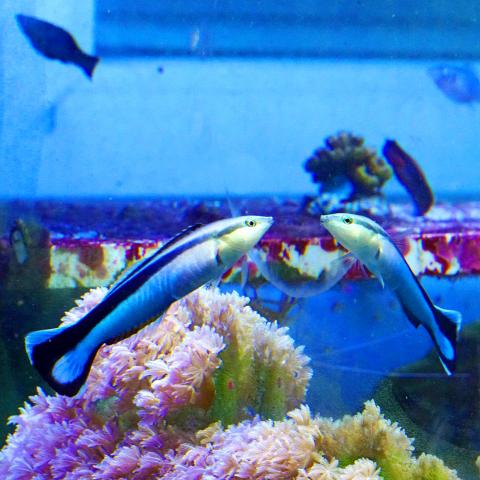A small tropical reef fish was able to recognize itself in a mirror, scientists said on Feb. 7 in a finding that raises provocative questions about assessing self-awareness and cognitive abilities in animals.
The study involved experiments in which the fish species Labroides dimidiatus, called the bluestreak cleaner wrasse, was given a mirror self-recognition test, a technique developed in 1970 for gauging animal self-awareness.
In aquarium experiments at Osaka City University in Japan, the researchers applied a brown-colored mark on the fish’s body in a place that could be seen only in a mirror reflection. The fish tried to remove the marks by scraping their bodies on hard surfaces after watching themselves in a mirror, but never tried to remove them without a mirror present, indicating they understood the reflection was of them, the researchers said. When a transparent, rather than brown, mark was applied, the fish never tried to remove it.

Photo: Reuters
照片:路透
The 10-cm species consumes parasites and dead tissue off skin of other reef fish in a symbiotic relationship. The brown mark’s color resembled the color of these parasites. The fish “shows behaviors during the mirror test that are accepted as evidence for self-awareness in many other species,” said evolutionary biologist Alex Jordan of the Max Planck Institute for Ornithology in Germany, who led the study published in the journal PLOS Biology.
Jordan, however, questioned whether the test represents a reliable measure of animal cognitive abilities. “I don’t claim that fish lack self-awareness, but rather that the minimal required explanation for the behaviors we observe in the mirror test does not require invocation of self-awareness, self-consciousness, or theory of mind,” Jordan said.
The test has been passed by great apes including chimpanzees, bonobos, gorillas and orangutans as well as dolphins, killer whales, an elephant and a magpie species, but failed by some other animals. Humans pass it at around 18 months old. “I consider that there is a spectrum of animal consciousness, with some animals, likely primates, showing abilities closer to human consciousness,” Jordan said. “My point with this paper is not that fish are as smart as chimpanzees, but that the way we ask that very question across taxa (animal groups) needs to be re-evaluated.”
University at Albany evolutionary psychologist Gordon Gallup, who pioneered the mirror test, called the new study “not methodologically sound” and faulted the researchers for a “zeal to undermine the integrity” of the technique to appraise animal self-awareness. Emory University primatologist Frans de Waal, who has studied mirror self-recognition in mammals, called the findings “interesting and provocative.” “The hope is that this study will throw open the discussion about self-awareness in animals. Instead of the black-and-white distinction we have had thus far, that some animals have it and most of them don’t, we need to develop a more gradualist perspective,” de Waal said.
(Reuters)
科學家於二月七日指出,一種小型熱帶珊瑚礁魚類能夠辨認出自己在鏡中的倒影。該研究對於評估動物的自我意識和認知能力,提出發人深省的問題。
這份研究的實驗對象是一種學名為Labroides dimidiatus的魚類,俗稱清潔魚或是藍帶裂唇鯛,科學家對其進行鏡像自我認知測試。這項測試方式發展於一九七○年,是用於判斷動物自我意識的技術。
於日本大阪市立大學進行的水族箱實驗中,研究人員在魚身塗上一塊褐色的記號,位置只能在鏡像中看到。這些魚在鏡中看到自己之後,便藉由在堅硬表面上摩擦身體,試圖抹除掉記號,但這類行為從來不曾發生在沒有鏡子的情況下。研究人員表示,這顯示魚類了解倒影是它們自己的。另外,如果塗上的記號是透明而非褐色的話,這些魚則不曾試圖抹掉。
這種魚類身長十公分,攝食其他珊瑚礁魚類身上的寄生蟲,以及從其他魚身表面剝落的壞死組織,形成彼此互惠的關係。科學家塗上的褐色記號,採用接近寄生蟲的顏色。這篇研究發表於期刊《公共科學圖書館:生物學》,由德國馬克斯普朗克鳥類學研究所的演化生物學家亞歷克斯‧喬丹主持,他表示這種魚「在鏡像測試過程中表現出的行為,在其他許多物種身上會被認可,視為表現自我意識的證據。」
不過,喬丹也懷疑此項測驗是否足以作為動物認知能力的可靠衡量方式。他表示:「我並不是宣稱魚類缺乏自我意識,反而應該是說,我們在鏡像測驗中觀察到的行為,所須最低限度的解釋並不需要訴諸自我意識、自覺、或是心智理論。」
包括黑猩猩、倭黑猩猩、大猩猩,以及紅毛猩猩等大型猿類都曾通過此項測驗,其他通過的動物也包括海豚、虎鯨、一頭大象和一種喜鵲,然而有些動物卻未能通過這項測驗。人類大約在十八個月大時通過測驗。喬丹表示:「我認為動物意識可以視為一個光譜,其中有些動物,例如靈長類,展現出的能力較為接近人類的自我意識。」他進一步指出:「我在這篇論文想要表達的論點並不是說魚類跟黑猩猩一樣聰明,而是我們對整個分類階層(動物族群)提出此問題的方式需要重新評估。」
紐約州立大學奧爾巴尼分校的演化心理學家戈登‧蓋洛普是鏡像測試的先驅,他認為這份新研究「在研究方法上並不健全」,並歸咎於研究人員為了評估動物的自我意識,「熱切想要顛覆該技術的公正性」。埃默里大學的靈長類動物學家法蘭茲‧德瓦爾長期研究哺乳類動物的鏡像自我認知,他認為這份研究「饒富趣味且引發思辯」。德瓦爾表示:「希望這份研究可以開啟關於動物自我意識的討論。與其沿用我們目前非黑即白的區別方式—也就是認定某些動物具有自我意識,而絕大部分則沒有—我們需要發展出一個較為漸進主義式的視角。」
(台北時報章厚明譯)

In an effort to fight phone scams, British mobile phone company O2 has introduced Daisy, an AI designed to engage phone con artists in time-wasting conversations. Daisy is portrayed as a kindly British granny, exploiting scammers’ tendency to target the elderly. Her voice, based on a real grandmother’s for authenticity, adds to her credibility in the role. “O2” has distributed several dedicated phone numbers online to direct scammers to Daisy instead of actual customers. When Daisy receives a call, she translates the scammers’ spoken words into text and then responds to them accordingly through a text-to-speech system. Remarkably, Daisy

Bilingual Story is a fictionalized account. 雙語故事部分內容純屬虛構。 Emma had reviewed 41 resumes that morning. While the ATS screened out 288 unqualified, she screened for AI slop. She could spot it a mile away. She muttered AI buzzwords like curses under her breath. “Team player.” “Results-driven.” “Stakeholder alignment.” “Leveraging core competencies.” Each resume reeked of AI modeling: a cemetery of cliches, tombstones of personality. AI wasn’t just changing hiring. It was draining the humanity from it. Then she found it: a plain PDF cover letter. No template. No design flourishes. The first line read: “I once tried to automate my

Every May 1, Hawaii comes alive with Lei Day, a festival celebrating the rich culture and spirit of the islands. Initiated in 1927 by the poet Don Blanding, Lei Day began as a tribute to the Hawaiian custom of making and wearing leis. The idea was quickly adopted and officially recognized as a holiday in 1929, and leis have since become a symbol of local pride and cultural preservation. In Hawaiian culture, leis are more than decorative garlands made from flowers, shells or feathers. For Hawaiians, giving a lei is as natural as saying “aloha.” It shows love and

1. 他走出門,左右看一下,就過了馬路。 ˇ He walked outside, looked left and right, and crossed the road. χ He walked outside and looked left and right, crossed the road. 註︰並列連接詞 and 在這句中連接三個述語。一般的結構是 x, y, and z。x and y and z 是加強語氣的結構,x and y, z 則不可以。 2. 他們知道自己的弱點以及如何趕上其他競爭者。 ˇ They saw where their weak points lay and how they could catch up with the other competitors. χ They saw where their weak points lay and how to catch up with the other competitors. 註:and 一般連接同等成分,結構相等的單詞、片語或子句。誤句中 and 的前面是子句,後面是不定詞片語,不能用 and 連接,必須把不定詞片語改為子句,and 前後的結構才相等。 3. 她坐上計程車,直接到機場。 ˇ She took a cab, which took her straight to the airport. ˇ She took a cab and it took her straight